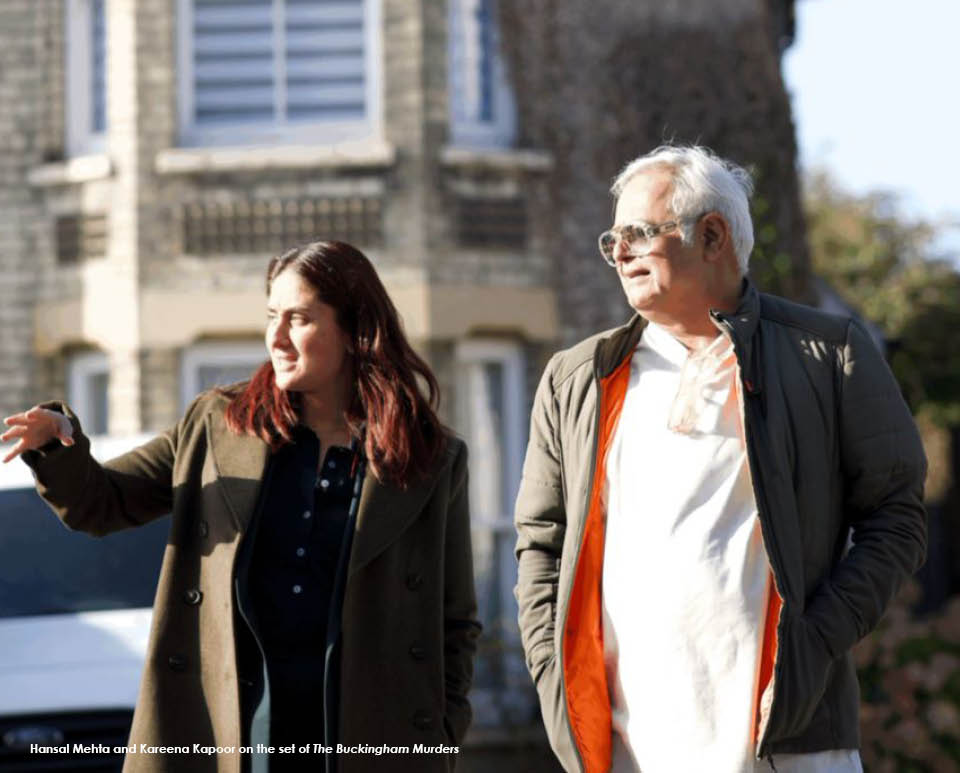
"The Buckingham Murders", a murder mystery told through the prism of migrant lives in the U.K., has just hit theatres in India. Another international project, "Gandhi", is yet to be released. These follow Indian projects such as "Scam", "Scoop" and "Faraaz". Vanita Kohli-Khandekar spoke to director Hansal Mehta...
You have now worked on two major international projects, "Gandhi" and "The Buckingham Murders". How do they compare with your Indian projects? “Buckingham was unique for two reasons. One, I was working with a major star after a long time. The last was Kangana (Ranaut in Simran, 2017). Two, we were shooting in the U.K. I opted for a predominantly British crew and most of them were women. Your creative energy gets far more challenged when you throw yourself into something with a few unknowns. And we made it within the time and budget. Many people have had opposite experiences because they come to the U.K., or any other international location, without a realistic expectation or understanding of it. If you are budgeted and prepped in that realistic manner, understand the work culture, it works. You cannot export your work ethic to another country.”
Can you give an example? “When I started my career in this business, we used to have a shift of eight hours. It is a healthy amount of time to shoot in. But then Zee TV and Star TV happened. The upsurge of dailies changed the culture. From eight hours, it became 12 hours. Now 12 hours is a day and it is the norm rather than the exception. Add travel and you essentially spend 14-15 hours working. Take out sleep and you are left with barely three to four hours for yourself. I don’t know any other country where this kind of inhuman planning exists. The good thing about shooting abroad is that shifts are shifts and they are finite. You either work within those with efficiency and planning or if you overshoot, you pay for it.”
There is so much to watch on TV, in theatres, on mobile, that there are no windows for release, discovery or appreciation. Does this deluge corrupt the relationship between the audience and filmm...
"The Buckingham Murders", a murder mystery told through the prism of migrant lives in the U.K., has just hit theatres in India. Another international project, "Gandhi", is yet to be released. These follow Indian projects such as "Scam", "Scoop" and "Faraaz". Vanita Kohli-Khandekar spoke to director Hansal Mehta...
You have now worked on two major international projects, "Gandhi" and "The Buckingham Murders". How do they compare with your Indian projects? “Buckingham was unique for two reasons. One, I was working with a major star after a long time. The last was Kangana (Ranaut in Simran, 2017). Two, we were shooting in the U.K. I opted for a predominantly British crew and most of them were women. Your creative energy gets far more challenged when you throw yourself into something with a few unknowns. And we made it within the time and budget. Many people have had opposite experiences because they come to the U.K., or any other international location, without a realistic expectation or understanding of it. If you are budgeted and prepped in that realistic manner, understand the work culture, it works. You cannot export your work ethic to another country.”
Can you give an example? “When I started my career in this business, we used to have a shift of eight hours. It is a healthy amount of time to shoot in. But then Zee TV and Star TV happened. The upsurge of dailies changed the culture. From eight hours, it became 12 hours. Now 12 hours is a day and it is the norm rather than the exception. Add travel and you essentially spend 14-15 hours working. Take out sleep and you are left with barely three to four hours for yourself. I don’t know any other country where this kind of inhuman planning exists. The good thing about shooting abroad is that shifts are shifts and they are finite. You either work within those with efficiency and planning or if you overshoot, you pay for it.”
There is so much to watch on TV, in theatres, on mobile, that there are no windows for release, discovery or appreciation. Does this deluge corrupt the relationship between the audience and filmmakers? “The relationship will change since the landscape is changing. I don’t see the fact that we have so much content in different forms as a disadvantage. The democratisation of content is bound to come with pros and cons.
When I started (in the 1990s), the only way I could tell a story was to make a feature film or, at the most, work for television, which did not want to listen to your stories anyway. They wanted to put out what worked for them at the time. And the result is they are in the doldrums right now.
We have really come a long way. I made Khana Khazana (Zee TV, 1993). It was the only place where you had an authentic Indian, recipe-based, food show. Today, recipes are all over Instagram, Twitter, YouTube, wherever you go, you will have chefs and recipes. It is great that so many chefs have made their interaction with the public into a business.”























